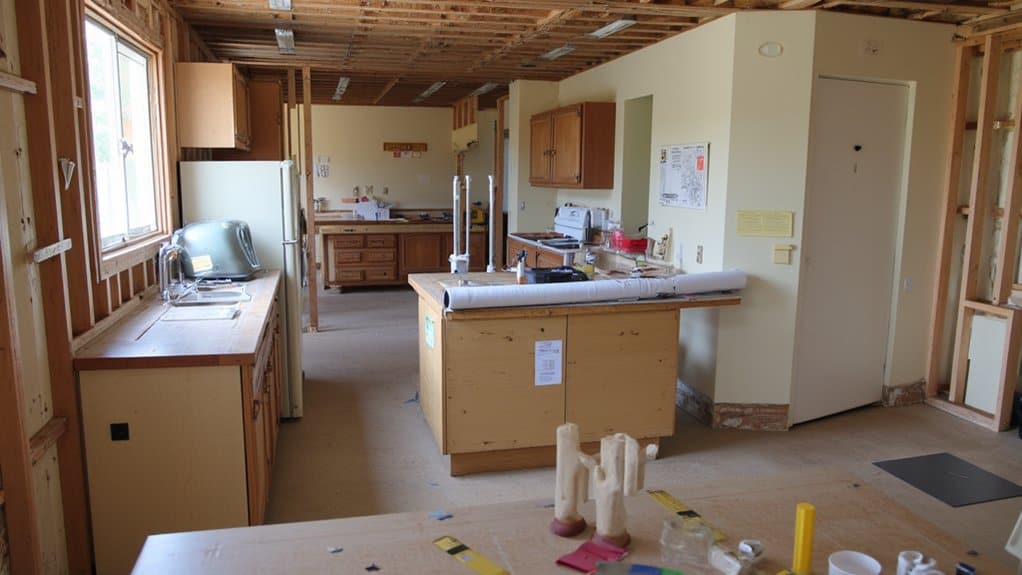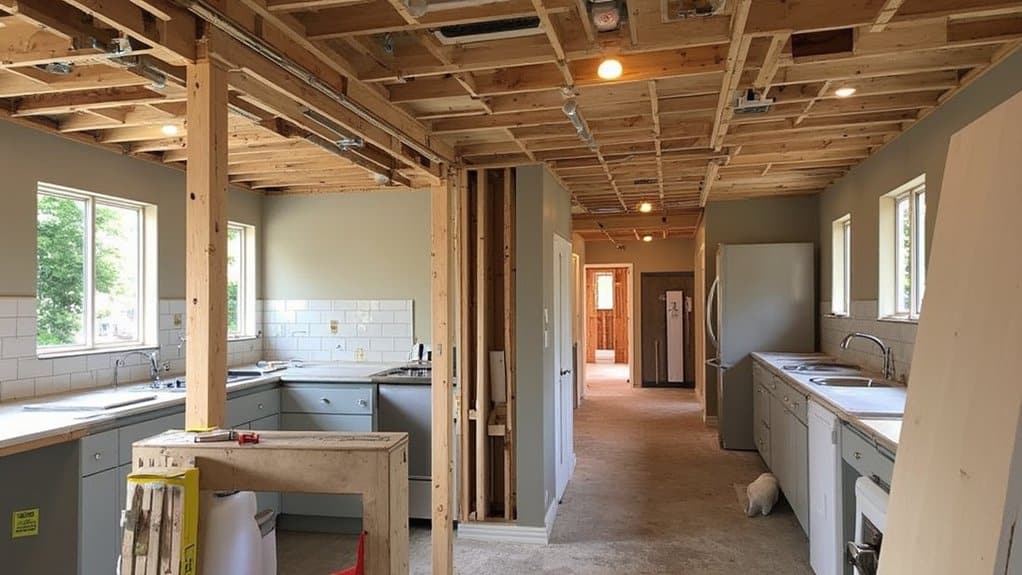Kitchen Renovation Value
Building a kitchen can transform your home, but you’ll need to understand the costs involved. On average, expect to spend between $15,000 and $50,000, depending on size—like a 10×10-foot space—and design. High-end projects often exceed this range. Let’s break down the key factors, from materials to labor, so you can plan wisely and avoid surprises. Stick with us to explore the specifics.
Kitchen Renovation Value
Curiosity often drives homeowners to question the true worth of a kitchen renovation. You’re likely wondering if the investment pays off in comfort and home value. A well-planned kitchen upgrade can transform your space, making daily tasks easier with better layouts and modern features.
Why Renovate?
- Improved Functionality: Gain more storage with cabinets up to 36 inches wide.
- Energy Efficiency: Install LED lighting, cutting utility bills by 30%.
- Aesthetic Appeal: Update countertops for a fresh look.
Plan carefully, measure your space—typically 10×10 feet for average kitchens—and prioritize needs over wants for real value.
Factors Affecting the Cost

Before you plunge into a kitchen build or renovation, understand that several key factors directly influence the overall cost of the project. First, consider the kitchen size; a 100-square-foot space differs vastly from a 300-square-foot layout in labor and resources. Next, think about the design complexity—custom features or intricate layouts drive up expenses. Also, factor in labor rates, which vary by region; urban areas often charge more. Finally, your timeline matters; rushed jobs might incur overtime fees. Weigh these elements carefully to budget wisely and avoid surprises as you plan your dream kitchen space.
Material Cost Analysis
As you plan your kitchen build, understanding material costs is key to staying on budget. Start by looking at granite countertops, which can range from $40 to $100 per square foot, maple cabinetry costs averaging $200 to $500 per linear foot, and stainless steel appliances priced between $500 and $2,500 each. Consider these ranges to prioritize where you’ll allocate your funds for the best value.
Granite Countertops
Many homeowners opt for granite countertops due to their durability and timeless appeal, but understanding the material costs is crucial for budgeting your kitchen build. Granite prices vary widely, ranging from $40 to $100 per square foot, depending on quality and origin.
Cost Breakdown
- Basic Granite: $40–$60 per sq. ft.
- Mid-Range Granite: $60–$80 per sq. ft.
- Premium Granite: $80–$100 per sq. ft.
Factor in your kitchen’s countertop area—typically 40–60 square feet. You’ll also pay for edging ($5–$10 per linear foot). Shop around, compare slabs, and request quotes to guarantee you’re getting the best value.
Maple Cabinetry Costs
When planning your kitchen build, consider maple cabinetry for its warm tones and durability, making it a popular choice among homeowners. Maple offers a classic look with strength to last.
Cost Breakdown for Maple Cabinetry
- Stock Cabinets: Expect $100–$200 per linear foot. For a 10-foot run, that’s $1,000–$2,000.
- Semi-Custom: You’ll pay $200–$350 per linear foot, totaling $2,000–$3,500 for 10 feet.
- Custom: Costs jump to $400–$800 per linear foot, or $4,000–$8,000 for the same space.
Assess your budget, measure your kitchen layout carefully, and choose based on design needs and long-term value. Stick to accurate dimensions for precise estimates.
Stainless Steel Appliances
Countless homeowners opt for stainless steel appliances to bring a sleek, modern vibe to their kitchen build. You’ll find these durable, easy-to-clean options elevate your space instantly.
Cost Breakdown for Stainless Steel Appliances
- Refrigerator (36-inch, French door): $1,500–$3,000
- Range (30-inch, gas or electric): $800–$2,000
- Dishwasher (standard size): $500–$1,200
- Microwave (over-the-range): $300–$700
Why Choose Stainless Steel?
You’re investing in longevity; these appliances resist stains and corrosion. Match them to your kitchen’s style, but budget carefully. Expect to spend $3,100–$6,900 total for a full set, depending on brand and features. Plan accordingly.
Contractor Hiring Expenses
When hiring contractors for your kitchen build, you’ll need to contemplate wiring installation choices that can affect the overall budget. Think about whether you’ll opt for standard electrical setups or more complex systems, as labor costs vary based on factors like kitchen size and wiring complexity. Keep in mind that these decisions can impact both timeline and expenses, so plan carefully with your contractor.
Wiring Installation Choices
As you plan your kitchen build, addressing the wiring installation stands as a critical step that demands careful consideration of contractor hiring expenses. You’ll need to guarantee safety and functionality.
Choosing a Contractor
Hire a licensed electrician for proper code compliance. Expect costs between $500 and $2,000 for a standard kitchen, depending on complexity.
Key Decisions
- Outlet Placement: Plan for at least 4-6 outlets along countertops, spaced every 4 feet.
- Lighting Circuits: Install dedicated circuits for under-cabinet and overhead lights.
- Appliance Needs: Ensure heavy-duty wiring for ovens and refrigerators meets electrical demands.
Factors Impacting Labor Costs
Beyond the basic wiring setup, you’ll need to understand the various factors that drive up labor costs when hiring contractors for your kitchen build. Contractor expenses vary widely based on key elements you’ll encounter.
Key Cost Factors
- Experience Level: Skilled contractors charge $50-$100 per hour, reflecting expertise.
- Project Scope: Larger kitchens (over 150 sq. ft.) demand more hours, increasing costs.
- Location: Urban areas often have higher rates than rural ones.
- Specialization Needs: Custom cabinetry or plumbing adds fees.
Carefully assess these factors, request detailed quotes, and compare contractors to manage your budget effectively.
Additional Costs to Consider
While planning your kitchen build, don’t overlook the extra expenses that often sneak up on homeowners during the process. These additional costs can inflate your budget if you’re not prepared, so factor them into your financial plan now.
Consider these unexpected expenses in your estimate:
- Permits and Fees: Local building permits can cost $500-$2,000, depending on your area.
- Utility Adjustments: Relocating plumbing or electrical lines might add $1,000-$3,000.
- Temporary Kitchen Setup: Renting a portable kitchen during construction could run $200-$500.
- Waste Disposal: Dumpster rental fees often hit $300-$600 per project.
Budget-Friendly Alternatives
Let’s shift focus to saving money with budget-friendly alternatives for your kitchen build. You can cut costs without sacrificing quality by making smart choices.
Cabinet Options
- Opt for ready-to-assemble (RTA) cabinets, costing $2,000-$3,000 for a 10×10 kitchen, versus $5,000 for custom.
- Reface existing cabinets for $1,000-$2,000, saving on full replacement.
Countertops and Flooring
- Choose laminate countertops at $20-$30 per square foot instead of quartz at $60-$100.
- Install vinyl flooring for $1-$2 per square foot, much cheaper than hardwood at $5-$10.
These swaps trim expenses while maintaining functionality and style.
Conclusion
As you wrap up planning your kitchen build, remember that costs can vary widely based on choices in materials, labor, and design. Let’s break it down.
Final Cost Overview
- Basic Kitchen (100 sq. ft.): $10,000-$15,000, using laminate counters and stock cabinets.
- Mid-Range (150 sq. ft.): $20,000-$30,000, with quartz counters and semi-custom cabinets.
- High-End (200 sq. ft.): $40,000+, featuring custom designs and premium appliances.
Double-check your budget, compare contractor quotes, and prioritize needs over wants. Stick to your plan, track expenses, and avoid last-minute changes to keep costs down. You’re ready to build!


